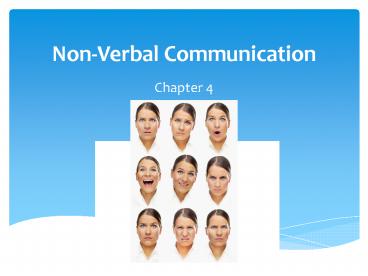Non-Verbal Communication - PowerPoint PPT Presentation
1 / 23
Title:
Non-Verbal Communication
Description:
Non-Verbal Communication Chapter 4 Understand the importance of nonverbal signals in communication Explain how body language can help or hinder communication. – PowerPoint PPT presentation
Number of Views:39
Avg rating:3.0/5.0
Title: Non-Verbal Communication
1
Non-Verbal Communication
- Chapter 4
2
Learner Outcome
- Understand the importance of nonverbal signals in
communication - Explain how body language can help or hinder
communication. - Describe how physical appearance can affect
communication - Demonstrate awareness of other common
non-linguistic methods of communication
3
Non-verbal communication
- Process of communication without using words
- Body Language
- Signs, Symbols and Logos
- Physical objects
4
Body Language
- Supports face to face oral communication
- Gestures and Facial Expressions
- Head and face signals
- Facial Expression
- Contact
- Proximity
- Orientation
- Posture
- Movement during speech
- Punctuality
- Dress and personal grooming
5
Gestures and Facial Expressions
Gathering up your paperwork when someone is
talking to you
Scratching head Nervousness
Tapping finger Impatience
Gestures covey different messages in different
countries
Clenched fist anger
Shoulder shrug dont know or dont care
6
Head and Face Signals
- Nodding and shaking head
- Shaking head with frown puzzlement
- Shaking head with eyes closed anger and
frustration - Important techniques when listening
- Nod signals agreement
- Shake signals disagreement
7
Facial Expression
Smiles pleasure, friendliness, agreement, warmth
Frown Disagreement
Eye Contact Honesty, sincerity, confidence and
focus No Eye Contact boredom, lack of confidence
or insincerity
Frown Deep thought
8
Facial Expression
- Use positive signs to indicate that you are
interested gives speaker confidence - In eye contact
- do not stare as this is rude and intimidating
- Eyes should travel across room
- Arrange room so you can maintain eye contact
- Without eye contact people get bored since they
feel isolated and left out
9
Contact
- A good firm handshake
- Signals beginning and end of meeting
- Signifies trust and good faith
- Strength indicates confidence or weakness
- Judged by handshake before they speak
- Be cautious when using form of contact other than
handshake - Think about offending people and cultural
differences
10
Proximity
- Proxemics Study of how people use space and
movement - Personal Space move closer to people you like,
move away from people you dislike - Comfort zone depends on circumstance
- Getting up from chair and shaking hand
acceptable move into someones space - Gaining trust, Setting up meetings
11
Orientation
- Direction your body is facing - The way we stand
in relation to one another shows our attitude and
frame of mind - Face the person you are speaking indicates you
are listening - Face away indicates no real interest
- Face audience
12
Posture
Sit back and look elsewhere Boredom
Sit with folded arms Defensive and resisting new
ideas
Sit forward and look at the speaker Active
interest
Lean back with hands back free, relaxed, trust
13
Posture
Stand Straight Confidence
Walking and looking down not confident
The way you sit tells a lot about yourself as well
14
Movement during Speech
- http//videohive.net/item/hand-nervous-gestures/82
1056
- When you are the person speaking, try to limit
nervous movements such as head scratching since
it distracts the other person
15
Punctuality
- Time you arrive for appointments - signals your
attitude - Lateness
- Disorganization
- Directly to regard other person as low priority
16
Dress and Personal Grooming
- Dress codes written down in most organizations
- Breaking code conveys your attitude towards
work - Smart, clean clothes and shoes shows you value
the company and the people you meet - Dirt or untidy clothes do not care about people
or values
17
Signs, Symbols and Logos
- Used to pass consistent message to anyone in the
world regardless of what language they speak - No words used means no language barriers
Universal language - Standardization of signs and symbols
internationally helps international
communication, trade and tourism
18
Signs and Symbols
- Used for directions or warning
- Advantage
- Tourists who dont speak language can understand
19
Symbols
- Signs contain symbols shortcuts that allow a
message which in words might be quite long - Can be used anywhere e-mail or text
- International currencies identify immediately
20
Logo
- Special symbol that identifies a company or
product - International brands logos transcends barriers
of language - Some companies logos have given them success e.g.
coca cola - Logos help companies identify themselves
21
Logos
22
Physical Objects
- send signals to other people about the wealth,
status and power of an individual
23
Questions































